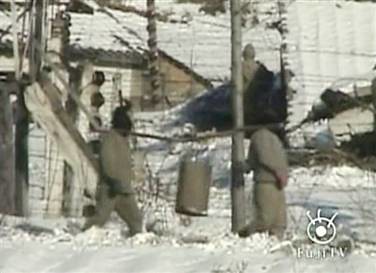The Other Gulag for Our Time
I sometimes have moments when I feel that this site is a stimulating conversation among friends that will never really amount to much. In fact, I’m having one of them now. When the intelligentsia that claims to speak for world opinion can’t distinguish between a gas chamber and fart in a crowded elevator, I tend to stare through the screen of my monitor, like Sisyphus looking past the stone, up an insurmountably steep grade of illogic. My latest such moment began when I read this:
Hypocrisy, an overarching war mentality and a disregard for basic human rights principles and international legal obligations continue to mark the USA’s “war on terror”. Serious human rights violations are the inevitable result.
[W]e draw the line at the use of the word “gulag” or at the implication that the United States has somehow become the modern equivalent of Stalin’s Soviet Union. Guantanamo Bay is an ad hoc creation, designed to contain captured enemy combatants in wartime. Abuses there — including new evidence of desecrating the Koran — have been investigated and discussed by the FBI, the press and, to a still limited extent, the military. The Soviet gulag, by contrast, was a massive forced labor complex consisting of thousands of concentration camps and hundreds of exile villages through which more than 20 million people passed during Stalin’s lifetime and whose existence was not acknowledged until after his death. Its modern equivalent is not Guantanamo Bay, but the prisons of Cuba, where Amnesty itself says a new generation of prisoners of conscience reside; or the labor camps of North Korea, which were set up on Stalinist lines; or China’s laogai , the true size of which isn’t even known; or, until recently, the prisons of Saddam Hussein’s Iraq.
Well said. My government is neither perfect nor above criticism. We are publicly debating a careful balance between the protection of our population and the protection of our civil liberties, matters on which we are free to disagree and usually do. I don’t expect everyone to share my belief that the exigency of protecting one’s citizens from international terrorists merits granting fewer legal protections for the latter than the former, or my belief that this means we will eventually need to write and strictly apply a legal code that applies only to terrorists, and not to “common” criminals. Those issues are debatable. The definition of “gulag” and the moral implications of the existence of an actual gulag are not. One need not torture the definition of “gulag” to find them when it is a sad fact that the real ones are all too plentiful. Other than the fact that today’s gulag operates on a smaller scale, recent video suggests that the real gulag of our time isn’t all that different from the gulag of other times.

A global human rights organization that expends its energy and credibility on a blend of questionable and valid concerns won’t have any left to expend on the outrages. I believe I’ve given enough of my time to protecting human rights to question just what Amnesty’s published reports–at least those available on its Web page–tell us about gulags in the country that’s been described as the worst place on earth. The results disappoint:
- Amnesty has never published a detailed report on North Korea’s gulags.
- Amnesty’s last report on North Korea’s “detention places” was published in 1999. It is two and a half pages long and discusses temporary detention facilities, rather than North Korea’s gargantuan gulag zones.
- Amnesty publishes approximately four reports on South Korea for every report it publishes on North Korea.
- In the last year, Amnesty has published one annual report on North Korea and dozens of reports on the United States, covering such issues as the death penalty and its adoption of Jeremy Hinzman, a hometown volunteer-turned-deserter, as a conscientious objector.
- And finally . . . and this is really at the heart of the matter . . . Amnesty has never called North Korea’s gulags, “gulags.”
In these times when we are told that global tests and world opinion matter so much, it is depressing to realize that those who score the tests can’t even read an eye chart.